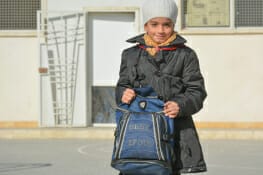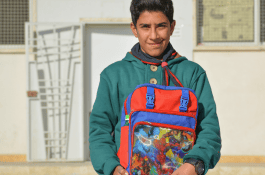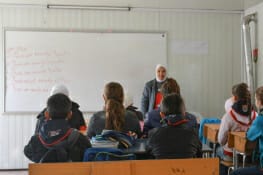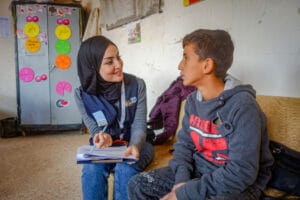
The context The protracted crisis in Syria has disrupted access to basic services for most of the population, mostly in…
Discover moreWe are present in Syria since 2011, right before the start of the crisis, with 3 Field Offices: Damascus, Aleppo and Deir-ez-Zor. In 2024 we started our operation in the Raqqa Governorate. Our work focuses on Education in Emergency, Water, Sanitation and Hygiene (WASH) and more recently Early Recovery & Livelihood.
Syria remains one of the world’s most complex humanitarian and protection emergencies. The consequences for the population are wide-ranging and profound, as it is estimated that in 2024 16.7 million Syrians - the largest number since the beginning of the crisis in 2011 – are in need of some form of humanitarian assistance, compared with 15,3 in 2023. As the crisis enters its thirteenth year, 7.2 million people remain internally displaced, many of whom living in overcrowded camps. 5.2 million people have fled their homes and are registered as refugees and asylum-seekers in neighboring countries, with limited prospects for return. Civilian infrastructures - such as schools and water supply systems - have sustained extensive damage and much of it remains unrestored or in disrepair, and most of it has not underwent regular maintenance.
Moreover, the recent economic shocks stand to further set back the recovery of the Syrian people and render many more vulnerable: millions of women, children and men continue to rely on humanitarian assistance to meet their basic needs. A significant energy crisis makes the crisis even worse. The provision of energy to households and infrastructures is limited to a few hours per day, and the cost of the fuel for the generators becomes not affordable for the majority of the population. Life remains a daily struggle due to limited access to basic services and up to 90% of the population is estimated to live under the poverty line.
In this context, the earthquakes that hit northern Syria in February 2023 - causing the death of more than 5,900 people and injuring more than 12,800 people - has worsened an already dire situation, further damaging crucial infrastructures and compromising even more the access to basic needs for the population.
We are present in Syria since 2011, right before the start of the crisis, with 3 Field Offices: Damascus, Aleppo and Deir-ez-Zor. In 2024 we started our operation in the Raqqa Governorate. Our work focuses on Education in Emergency, Water, Sanitation and Hygiene (WASH) and more recently Early Recovery & Livelihood.
In recent years the core areas of intervention have shifted from urban to rural, especially remote communities, more isolated and with greater effects of the crisis and the destruction. In these areas, very few services and job opportunities are available, and the gradual return of the families who abandoned their houses during the conflict risks to put pressure on an already limited access to basic services.
The protracted crisis has had a dramatic impact on the education quality and on school facilities, which are currently insufficient and mostly inadequate. In addition to that, the dire economic situation prevents children to attend school and increases the risk of child labor and early marriage, as well as prevents teachers to reach the schools located in remote areas. Our efforts focus on improving access to safe and protected learning environments and strengthening quality of the services provided, in order to build the resilience of the education system and the affected communities through:
Syria’s water system has suffered extensive damages to infrastructure – exacerbated in the Aleppo rural areas by the earthquakes of 2023 -, with inadequate capacity for operation and maintenance, loss of skilled technical staff and lack of access to electricity. Therefore, water resources are often insufficient, both in quantitative and qualitative terms. Since the beginning of operations in Syria, we have intervened through:
The dire economic situation, together with the crisis of the education system, led to a significant unemployment and the lack of an income for millions of families. We aim at creating livelihood opportunities by strengthening the linkages between the educational system and the labor market, through:
In the immediate aftermath of the earthquake that hit the north of Syria in February 2023, we intervened to provide prompt relief support to the affected population and set the basis for the mid-term and long-term response, in the Aleppo Governorate. In 2023, we reached around 920.000 people in need, the majority of whom women and children, in terms of WASH, Education, Shelter and Non Food Items. The multi-sectoral and area-based intervention happened with an harmonized and integrated approach.
The context The protracted crisis in Syria has disrupted access to basic services for most of the population, mostly in…
Discover moreThe continued Syrian conflict has greatly weakened the Syrian educational system. Nowadays 5.6 million of people between students and education…
Discover moreThe Syrian crisis has reached its 6th year and the consequences for children have worsened with more than 2.000.000 children…
Discover moreThe project aims to guarantee the access to quality of basic education through the rehabilitation of 4 public schools and…
Discover moreIn Syria, the majority of enrolment losses (2.1 million children) occurred in basic education with particularly high losses in Deir-ez-Zor…
Discover moreThe project aims to ensure access to safe, equitable and quality education for Syrian children and adolescents affected by the…
Discover moreThe action aims at ensuring access to basic WASH-related needs for the most vulnerable resident population and IDPs living in…
Discover moreSyria is the country bordering Iraq which saw the largest flood of Iraqi refugees into its borders, to the point…
Discover more